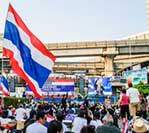THAILAND’S latest coup is in its third week, with different countries reacting differently.
Some four dozen countries have sounded travel warnings. The EU is anxious, while the United States was alarmed enough to cut off annual military assistance. Asean countries, however, have been more relaxed, since Thai politics is more familiar to them. This was just one more Thai coup, and one without shootings, killings or torture.
The coup also made it into Asean Isis’ Asia-Pacific Roundtable (APR) in Kuala Lumpur during the week, an annual think tank conference rated among the world’s top 20.
Wednesday’s final session on Thai politics was the most current, requiring close analysis beyond idealised notions and stock slogans.
How would the coup, for example, impact on the budding Asean Community slated to take off next year? The short answer is it should have little or no impact, since it is inwardly directed whereas the Asean Community essentially reflects relations among Asean countries.
Thailand’s position on transnational institutions like the World Bank and its relations with its neighbours remains unchanged.
Far from being a threat to other Asean countries, a coup could well redirect tourism and foreign investment to them.
Nonetheless, no coup should be more immune to criticism than any other political act. But as elsewhere, credible criticism has to be informed and well-intentioned.
During the APR session, a speaker suggested that instead of staging a coup the army could have let the February election result favouring Yingluck Shinawatra’s Pheu Thai party stand.But that would have required the army to violate the law overtly and forcibly, which the army is not disposed to do.
Another suggestion was that the army should have forcibly ensured a new election could proceed unhampered.
But that would have led to further criticism of the army engineering a forced election, the losing side rejecting the results, and the prospect of blood on the streets. Besides, the military and the police are not authorised to initiate an election – unlike a post-coup junta, as now.
Prior to the coup, the besieged government could neither call an election nor even name a date for it. The all-consuming protests that overcame governance until the May 22 coup were primarily aimed against a Thaksin-directed government controlled by the former premier from abroad.
Political affiliation aside, their motivations and resilience must be understood to comprehend the Thai situation.
But to the complaint of graft against the Thaksin-friendly government, the standard rebuttal is that politicians in other parties are guilty of graft anyway. This ignores three major considerations.
First, graft allegations against opposition figures like protest leader Suthep Thaugsuban concerned private gain, not vote-buying. Second, such graft cases did not involve buying influence at the palace.Third, Thaksin Shinawatra broke all records with the scale of his improprieties.
For Thais who just want to move on, the conduct of Gen Prayuth Chan-ocha’s army remains under intense scrutiny. Prayuth and his colleagues must surely understand that.
For months, Prayuth had denied any plans for a coup. But he did frankly admit at one point when the government had become dysfunctional that he could not rule out a coup, which does not show stealthy planning.
For days before the coup, Prayuth appealed repeatedly to both sides to reach some mutual accommodation. But all requests for compromise were in vain.
Then former prime minister Yingluck was summoned to the Royal Army Club, but she was no longer in office. Her successor Niwatthamrong Boonsongpaisan was then summoned, but he went into hiding.
By then Prayuth knew he needed to talk with Thaksin himself, through a Pheu Thai minister. With no proposal forthcoming from the government, Prayuth offered three options to resolve the crisis. Thaksin rejected all the options, insisting that Pheu Thai remain in power regardless. Prayuth then decided to break the impasse as army chief.
During their detention, government and opposition leaders were placed in the same room to make them see eye to eye. Protest leaders on both sides were also put in the same room – but still there was to be no compromise.
Since civilian leaders had failed, army leadership took over. The ruling National Council for Peace and Order’s (NCPO’s) national reconciliation centres attracted public scepticism at first, but there have since been some flickers of promise. In parts of the northern provinces, Thaksin’s stronghold, some signs proclaiming “Red Shirt zones” have reportedly come down. In Nakhon Ratchasima near Bangkok, Red and Yellow Shirt members have even pledged to put an end to their battles.
Nearly all the detainees have been released and most of the media restrictions have been lifted. The nationwide curfew is being trimmed down and lifted completely in some places.
An all-party advisory panel has been formed to provide inputs for the NCPO. A three-stage plan for returning to parliamentary democracy with elections is in the pipeline.
Prayuth is unlikely to declare himself Prime Minister for Life or even arrange an election to win by a landslide.
Now there will be an interim government in three months.
Strong Thailand-China ties mean that any Thai government can expect cooperation and assistance from Beijing. Thus the United States may soon be adjusting its policies more favourably towards Thailand.
Bangkok will continue to see coups, but that means it will continue to have parliamentary democracy in between.
Pessimism is unjustified because things will not change drastically, and optimism is also unwarranted because things will largely remain the same.
Article by Bunn Nagara which appeared in The Star, 8 June 2014





